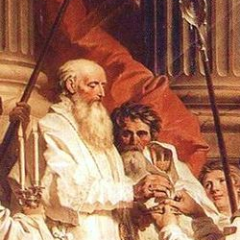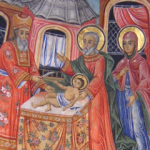
A rich young ruler comes to Christ and asks what it takes to inherit eternal life. Jesus says, “Sell all that you have and distribute to the poor. . . .”
Christ is enthroned in glory and he divides the crowds to his right and left. He welcomes those on his right, saying that they ministered to him when he was hungry, thirsty, lonely, naked, sick, and imprisoned. They’re surprised. “When did we do these things?” they ask. Christ answers, “Truly, I say to you, as you did it to one of the least of these my brothers, you did it to me.” It’s a different story, as we know, for those on his left.
When Basil of Caesarea (today known as Kayseri in Turkey) grappled with these passages, he was convicted to act.
Born in the year 330 to a wealthy family, his early life was marked by privilege and, as he termed it, vanity. His family was devout—the number of saints from under his roof is rather astounding—but like many young men he lacked an appreciation of his Christian heritage and upbringing. Then after studies in Constantinople and Athens, he had an awakening. The year was 356.
Basil reencountered the gospels (specifically the passages like those above) and was floored by the message of radical charity and asceticism. His father had died by then, and Basil took his considerable inheritance and began giving to the poor. He next traveled to the deserts of Egypt, Palestine, and Syria to learn from the ascetic and monastic communities there. He soon founded his own monastery at home, and his sister Macrina, widowed mother Emily, and brother Peter all joined him there to aid in prayer and charitable labors.
Basil’s life was not lived in seclusion despite is ascetical focus. He participated in the theological controversies and social crises of his times, eventually leaving the monastery and becoming a priest in 365 and then bishop in 370.
These were difficult days. Divisive heresies challenged the unity of the Church, and a major drought and subsequent famine hit the region. While diligently working to defend the faith and hold together his congregation, Basil also challenged the privileged and powerful. He preached several sermons on what today we term social justice. They were strong indictments of the selfishness of some in light of the widespread need of others.
From one sermon: “You gorgeously array your walls, but do not clothe your fellow human being; you adorn horses, but turn away from the shameful plight of your brother or sister; you allow grain to rot in your barns, but do not feed those who are starving; you hide gold in the earth, but ignore the oppressed.”
From another: “If we all took only what was necessary to satisfy our own needs, giving the rest to those who lack, no one would be rich, no one would be poor, and no one would be in need.”
It perhaps sounds extreme or simplistic, but just as Basil was earlier convicted to act so was his congregation. During the time of crisis, Basil sold and distributed what was left of his inheritance, and many of his people parted with their wealth and goods as well. Together by the gates of the city of Caesarea they founded a place of refuge for the hungry, the poor, the homeless, and the infirm. Because of all the food and aid delivered by Basil’s efforts, his friend, St. Gregory Nazianzen, called him a “second Joseph.”
All of this merely scratches the surface. But the life and influence of St. Basil the Great stands as a powerful reminder that true and effective social justice is grounded in the Gospel and comes from a place of prayer and self-sacrifice.
To read St. Basil’s sermons for yourself, check out C. Paul Schroeder’s translation: St. Basil the Great, On Social Justice.












